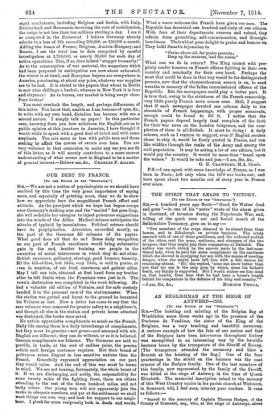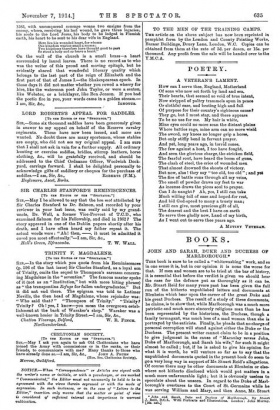AN ENGLISHMAN AT THE SIEGE OF ANTWERP-1583.
[To TEL EDITOR OF THE .SPEOTITOE."] Sin,—The hoisting and saluting of the Belgian flag at Wimbledon some three weeks ago in the presence of the Duchesse de Vendome, the sister of the King of the Belgians, was a very touching and beautiful ceremony. A curious example of bow the fate of our nation and that of the Belgians have been interwoven throughout history was exemplified in an interesting way by the heraldic banners borne by the trumpeters of the Sheriff of Surrey. [The trumpeters attended the ceremony and blew a flourish at the hoisting of the flag.] One of the four quarterings in the shield on the banners was the coat armour of the Hodges family. One of the last members of this family, now represented by the family of the Sheriff, was killed at the siege of Antwerp in the time of Queen Elizabeth. The memorial inscription raised to the memory of this West Country squire in his parish church at Wedmore, in Somerset, will, I feel sure, interest your readers. It runs as follows :—
"Sacred to the memory of Captain Thomas Hodges, of the County of Somerset, esq., who, at the siege of Antwerpe, about 1583, with unconquered courage wonne two ensigns from the enemy, where, receiving his last wound, he gave three legacies; his soule to the Lord Jesus, his body to be lodged in Flemish earth, his heart to be sent to his dear wife in England.
Here lies his wounded heart, for whomo One kingdom was too small a roome ;
Two kingdoms therefore have thought good to part Bo stout a body and so brave a heart."
On the wall of the church is a small brass—a heart surrounded by laurel leaves. There is no record as to who was the writer of this proud and moving epitaph, but he evidently shared that wonderful literary quality which belongs to the last part of the reign of Elizabeth and the first part of that of James I.—the Shakespearean epoch. In those days it did not matter whether you rowed a wherry for hire, like the waterman poet John Taylor, or were a sexton, like Webster, or a bricklayer, like Ben Jonson. If you had the poetic fire in you, your words came in a golden stream.—















































 Previous page
Previous page